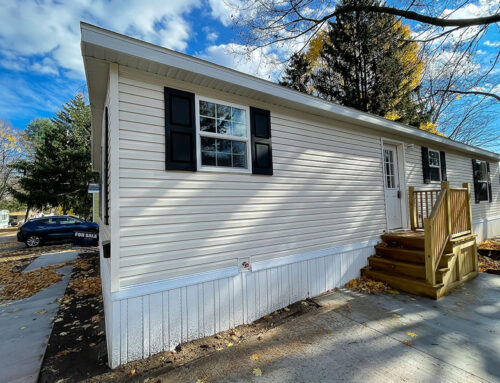Several months ago, my friend Lawrence and I had a meeting over lunch about where to buy investment property in New Jersey. I’ve been investing in real estate for a long while and, at the time of our chat, he hadn’t bought a property yet. So, he was looking for some direction. Since then, he’s bought a rental property and, unfortunately, has also become a very unhappy camper. Being a landlord in NJ, or anywhere for that matter, isn’t always what it’s cracked up to be. The responsibilities are considerable and the rewards don’t always outweigh the risks. I did warn him about this at our previous meeting. But, in typical Lawrence fashion, he likes to learn things the hard way. We’re meeting again this weekend over at Congress Station—my favorite coffee shop in Jersey City—where I hope to convince that hard head of his to heed all of my advice this time around.
The Responsibilities of Being a Landlord in NJ
To be fair, I get why Lawrence decided to invest in a rental. The state of New Jersey seems to favor renters. Garden State homeowners pay the highest property tax rate in the nation and they’re heavily taxed on their income as well. This creates enough of a financial squeeze to prevent many residents from ever buying a home, and it can push current homeowners out of their own properties and into the units of others. The hard numbers seem to be telling this story too. Six out of the top ten U.S. cities with the highest percentage of renters are in New Jersey, according to City-Data. So, if I were a new investor thinking about investing in New Jersey real estate, I might consider buying rentals as a way to tip my toe in the water, meet the demand of renters, and build my portfolio too.
But, I’m not a new investor and so I understand that there is more than meets the eye when it comes to being a landlord—which I’ve outlined below. If you need a quick pros-and-cons list for holding rentals, take a look. It might save you from having to learn things the hard way.
Pros of Holding Rentals
- Monthly revenue stream. If you can keep your monthly operating expenses pretty low, and your tenants’ rents relatively high, it’s possible to produce a predictable monthly revenue stream. Rents in New Jersey are among the highest in the nation. So, if your loan payments, maintenance costs, taxes, and property and liability insurance are less, you’ve got yourself a way to make passive income from your real estate investment.
- Tax advantages. Owning a rental can allow you to maximize tax advantages to benefit your bottom line long-term. Since rental property is considered a business asset, you may be able to deduct mortgage interest, some operating expenses, renovation costs, insurance, and marketing and legal fees. You could also deduct the normal wear-and-tear of a property with a depreciation deduction. Depending on how you structure your real estate investing company, you may be able to offset self-employment tax as well. Here in New Jersey, you’re gonna need every tax break you can get your hands on.
- Property value appreciation. The real estate market tends to be less volatile than the stock market as, generally speaking, property values appreciate over time. There are ups and downs, to be sure, but market dips are rarely as deep as what we saw during the housing crash and not as rough to ride out if you’ve got time on your side. In some of the fastest-growing towns, like Jersey City, the ride isn’t even that long; median list prices for single-family homes have jumped 35% in only three years according to Realtor.com. You can increase your property’s value, too, by improving or adding amenities.
Cons of Holding Rentals
- Maintenance costs. Whether it’s a broken faucet or an all-out flood from a broken pipe, the cost to upkeep your rental doesn’t end when a tenant’s contract begins. In fact, in New Jersey, landlords have to abide by the implied warranty of habitability, which outlines how to maintain a property so that it remains safe and livable for all occupants. But, in addition to addressing issues like structural damage, plumbing problems, and the environmental dangers of mold and asbestos that are outlined in the ordinance, you may also have to pay for any regular maintenance costs, like lawn and pool care. And, if you neglect these responsibilities, your tenants may have the right to withhold their rent, leave without notice, or even sue you.
- Tenant issues. Unfortunately, there always seems to be issues when dealing with tenants. There’s never a guarantee they’ll pay the rent on time or in full, even when they’ve done it for years. They won’t necessarily treat the property with respect either—and not just because they’re horrible people. Anything from job loss to failing health can impede an otherwise responsible tenant from making their rent and caring for the unit. Of course, you’ll still have to pay the mortgage and maintain the property whether you’ve got money coming in or not. If a tenant deliberately causes damage to a unit that isn’t covered by their security deposit, you’ll have to come up with the funds for that too. Don’t think, however, that you can simply evict a tenant who’s causing trouble and costing you cash. The New Jersey Department of Community Affairs has strict guidelines on what constitutes grounds for an eviction and it is costly if you violate them. So, get to know these rules or a judge may rule against you in court.
- Concentration risk. Contrary to the popular notion that holding rentals creates diversification in your real estate portfolio, owning rental property can actually do the opposite. By holding onto one or more properties for long periods of time, you’re concentrating your assets and increasing your long-term exposure to risk. If the neighborhood gets devalued because of crime or poor schools, your property’s value could fall and take any future returns with it. In addition, if the measures you take to protect your investment property don’t cover your losses when a disaster, like Hurricane Sandy, strikes, you could lose your tenants, your income, and your property. Putting all of your time, attention, and money into one asset just isn’t a good idea—not if you want to reduce your risks.
The cons of holding rentals weigh a little heavier than the pros on my scale, which is why I purchase single-family homes with the intent to renovate and resell. The hassles of being a landlord don’t appeal to me. But, what I like even less is tying up potential returns that could be used to invest in other properties. And, as it stands, I’m in and out of rehabs anywhere from three to nine months—which is not uncommon. So, worrying about selling during some unknown future market condition is never on my radar. But, having a great team at my side that helps me execute my real estate investment strategy is.
A Better Way to Execute the Best Investment Strategy
Building a network of more experienced investors you can call upon for advice, and getting a mentor who can steer you away from potential investing pitfalls, is as invaluable an investment as just about anything else. Because, no matter what investment strategy you ultimately choose, the best way to ensure you execute it effectively is to surround yourself with support you can reliably lean on. As an independently owned and operated HomeVestors® franchisee, I have that support in the form of a regional network of other franchisees and my own personal Development Agent. Without them, I might have become an unhappy investor, like Lawrence, dealing with issues that bruised my patience as much as it did my bottom line. With them, I perfected my niche of buying, renovating, and selling houses for profit and built a professional real estate investment business that keeps me, well, investing.
If you’re looking for a better investment strategy and the best way to execute it, then heed my advice. Contact HomeVestors® about becoming a part of the team today.
Each franchise office is independently owned and operated.
Contact
"*" indicates required fields





